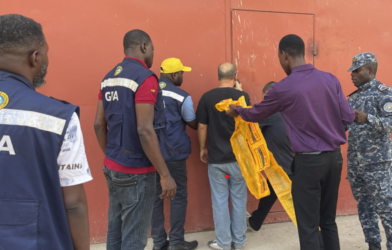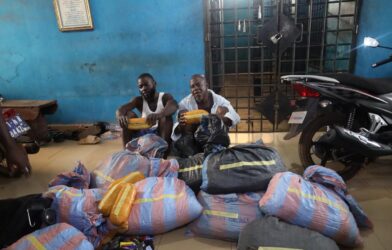By Robicon Mornahson
Hon. Ali Adolf John Mburudiba took office on January 30, 2025, as the Northern Regional Minister about six months ago. Yes, some will say it is relatively early days in a likely 4-year mandate, but folks like me and others are getting worried about his vision and direction, particularly in consonance with that of H.E. President John Mahama in the Northern Region.
The Northern regional minister’s lack of clear footprints, significant intervention, or even apparent understanding of the region’s challenges has become harder and harder to ignore.
In a place that is trying to deal with its existing epidemic of youthful drug addiction, a trend that is robbing Tamale of its future leaders, the Minister has not exhibited leadership that has inspired the public to take him seriously in this matter, let alone to show the way forward in solving the problem.
At the very least, it is disturbing; at the worst, it is dispiriting that there is no regional-response solution offered or possible. This situation is in stark contrast to the rest of the country, where regional ministers, along with their MMDCEs, are collaborating on city beautification, fixing ordinary street and traffic lighting systems, repairing broken infrastructure, and developing grassroots initiatives.
Sadly, our regional minister seems to be more concerned with capacities and brand names (delivering speeches at corporate events and weddings) than seriously addressing the needs of ordinary people that are swarming around him in Tamale and beyond. The gap is growing between the people and their leadership.

However, beneath the calm facade I am presenting, it is undeniable that the Northern Region continues to face historical development challenges that require urgent, sustained, and committed leadership response.
The Long List Of What Won’t Be Easy To Resolve Anytime Soon
Inadequate Infrastructure
The road network is still underdeveloped in both the Tamale metropolitan area and its surrounding rural environs. That impedes access to markets, education and healthcare. Key to the re-emergence of Tamale is addressing the issue of broken streetlights and traffic lights, which undermine public safety and hinder public movement. Most schools and health units are in a deplorable situation, with no facilities whatsoever.
Youth Unemployment and Drug Abuse
Among the most serious problems is the increase in youth drug abuse, especially in cities such as Tamale. Once-bustling parts of the city have turned into a wasteland at night with groups of young people who wander and wonder if they’re young and intoxicated.
While there is no direct action by the region’s authorities, in some areas, worried residents have set up local task forces to stem drug abuse and the trade. These groups are largely cut off from official support; the few who take risks are forced to battle threats, short supplies, and little more than lip service from authorities who are not enthusiastic about allegations that a poor region is being used as a warehouse by Nigerian sex slaves. These are regular people in an extraordinary crisis; they can’t do it alone.
Additionally, youth unemployment and underemployment remain alarmingly high. Idle and frustrated young men and women dot the region. With no ecosystem for enterprise creation, vocational training, or startup incubation, the Northern Region is relegating an astonishingly high quantity of talent and potential to waste.
Agricultural Underdevelopment
Despite being Ghana’s cereal bowl, the area heavily underinvests in irrigation, post-harvest handling, and access to input markets. The majority of farmers continue to practice rain-fed agriculture in the highlands, a gamble that increasingly doesn’t pay off amid climate change. Credit and extension services are not yet reaching many of the smallholder farmers.
Poor Urban Planning and Sanitation
The fast growth of Tamale has not been complemented with appropriate urban planning. Slums, poor drainage and waste management contribute to flooding and related health issues.
Education and Healthcare Deficits
In certain rural areas, schools still largely consist of children learning under trees or in unsafe classrooms. Frequent dropouts, especially among girls, and teacher scarcities paint a bleak picture of educational equality.
Healthcare access is equally dire. Challenges in Fundraising. There is an acute shortage of trained healthcare workers around embayments. Referral systems are weak, and mental health and maternal care receive little attention.
Economic Stagnation
The private sector perceives the Northern Region as a high-risk area, caused by the lack of security and poor infrastructure. Unfortunately, there is little to stimulate investment or to develop tourism and the creative arts.
Weak Local Governance
Effective local governance is at the root of community development. But numerous District and Municipal Assemblies in the Northern Region are impotent in the performance of their duties, as these are hindered at multiple systemic levels:
a. Capacity Deficits
Few gather with expert planners, bankers, engineers, educators, and physicians.” The consequence is a bad design of development programmes or their non-execution. Key directorates frequently operate with a skeleton staff, affecting service delivery and oversight.
b. Resource Constraints
Own Source Revenue (IGF) is inadequate, and central government funds are often late. By implication, it also compromises the ability of assemblies to implement projects, provide social services, or react to emergencies. Even the most rudimentary logistical work, such as office supplies and the provision of cars, has been denied, hampering productivity.
c. Political Meddling and Absence of Leadership
Development remains at the altar of party politics in several districts. MMDCEs are more interested in political survival, not the service of their people. The development agenda is thus distorted by patronage, not community priorities. Widespread disappointment breeds as aid does not quite reach the right people.
d. No coordination with the Regional Minister
An obvious problem is the disconnect between the Regional Coordinating Council (RCC) and the MMDCEs. Without bold regional leadership, local governments act in silos that sometimes replicate or work against each other. This loose alignment slows down development projects, makes it more difficult to track programmes and creates disjointed action in the face of urgent regional challenges (youth unemployment, sanitation, drug abuse).
e. Exclusion of Citizens from Decision-Making
Planning consultations with the local community are virtually non-existent. Such non-involvement results in low ownership and weak sustainable development interventions. The ideal of inclusive governance remains elusive.
A Call for Leadership, Not Comfort
There are many challenges, and no one leader can address them all overnight. But leadership isn’t just about being elected; it’s about being visible, responsive and having the guts to tackle difficult problems head-on.
It’s not sufficient to preach “peaceful coexistence” anymore. Peace must be more than a word; it must be accompanied by action through development, accountability and social justice. The Northern Region needs a proactive, available and practical regional minister.
With 3½ years in office, Hon. Mburudiba has time to make corrections. But the work has to start now, with open arms, because we also lived for so long abandoned, never knowing what the crusaders of this world would make of us, and bold action, and a readiness to sacrifice for the future of the region.
The Northern Region is watching. And waiting.












